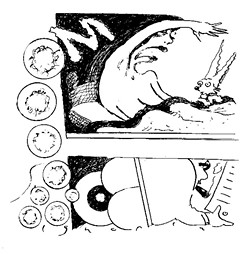Since April 2011, a mysterious deep, echoing, boom has been heard every Tuesday morning, spring through fall, throughout northwest Washington, D.C. It's always the same noise, between 6:30 and 8 a.m., and seems to originate from the south, likely across the Potomac River. The rumor was that it was early-morning drills from Arlington Cemetery, but I haven't been able to confirm this. Conspiracy? Very loud garbage truck? My dog and I are dying to hear your answer booming across cyberspace.
—Beth Venit
You, your dog and everyone else, my friend. The mysterious-boom phenomenon is widespread enough to warrant an entry in the dictionary—brontide, defined by Merriam-Webster as "a low muffled sound like distant thunder" that's "thought to be caused by feeble earth tremors"—as well as a robust selection of regional appellations worldwide: Off the coast of the Netherlands, they're called mistpoeffers; in Haiti, it's the gouffre. Here in the U.S., noises of murky provenance have been reported, in recent memory, as far afield as Charleston, S.C., and Clintonville, Wis. The latter, a series of which Wisconsinites heard in 2012, were ultimately blamed on shallow earthquakes, not strong enough to cause any shaking but variously audible, according to CNN, as "rattling pipes, clanging metal, thunder or firecrackers."
The former? Who knows? It's not like no one's had time to work it out, either—these booms have been going off for centuries. On expedition in Montana in 1805, Meriwether Lewis (of "and Clark" fame) reported hearing at irregular intervals a noise he called "the unaccountable artillery of the Rocky Mountains." James Fenimore Cooper, describing circa 1850 the noises heard over Seneca Lake in upstate New York, arrived at the same metaphor: "a sound resembling the explosion of a heavy piece of artillery, that can be accounted for by none of the known laws of nature. The report is deep, hollow, distant and imposing. The lake seems to be speaking to the surrounding hills, which send back the echoes of its voice in accurate reply." "Seneca guns" caught on as a term for the phenomenon, yet folks are still fighting about what it actually is; no less than the U.S. Geological Survey concedes that there "does not appear to be any agreement on what causes the Seneca guns." Let's look at some of the contenders:
It's probably not UFOs, not that that hasn't been (inevitably) suggested. It's also probably not a hypersonic U.S. spy plane, though some Brits were keen to suggest such when they heard a series of loud booms coming from the sky in late 2014. That said, the military has claimed responsibility in some cases; some coastal Virginians spent weeks trying to figure out the source of one boom in the 1970s before the Navy finally admitted that, yep, one of its planes had gone supersonic off the coast. It's probably worth keeping in mind that Charleston, where such noises are frequently reported, is home to a joint Air Force-Navy base, and it's not like those guys are eager to spill the beans about what they're getting up to.
The credit for those booming noises in Britain ultimately went to a meteorite, which—it was surmised—flamed out over the British Isles before ditching into the sea.
As mentioned above, seismic activity is always a good guess. According to a 2011 paper from the Seismological Society of America, "it seems that even smaller earthquakes are capable of producing audible sounds with no perceptible shaking," as was the case in Wisconsin. This includes activity offshore—tsunamis, such as those caused by subsea earthquakes, are known to be capable of producing loud booming sounds—and a phenomenon called cryoseisms, wherein subterranean ice thaws or freezes rapidly, giving off a cracking sound in the process.
Back at Seneca Lake, the prevailing theory points to underground natural gas deposits escaping to the surface. Given your proximity to the U.S. Capitol, Beth, I don't think gaseous outbursts can be definitively ruled out.
While we're here, we'd be remiss not to mention the mysterious boom's sonic cousin known as "the Hum": a low-frequency auditory phenomenon that, by some estimates, between 2 and 10 percent of the world's population is able to hear. (And perhaps be driven mad by—at least one amateur researcher has tried to link the Hum to the prevalence of U.S. mass shootings.) A 2004 paper in the Journal of Scientific Exploration excluded the possibility that it's just tinnitus (for what it's worth, I'd excluded that possibility myself in a 1998 column) and suggested—not conclusively—that radio transmissions might have something to do with it. Further tests are pending.
Anyway, which of the above is you? Well, none of them, actually—I'm afraid your initial hunch was the correct one. "Yes, it is coming from here," emails Jennifer Lynch, a public affairs officer at Arlington National Cemetery. "The Old Guard practices its battery salute every Tuesday before the cemetery opens." The Old Guard, officially known as the 3rd U.S. Infantry Regiment, conducts military ceremonies at high-profile occasions—presidential inaugurations, state funerals and the like—and thus naturally needs to stay sharp. So much for nature's timeless mysteries.
Send questions to Cecil via StraightDope.comor write him c/o Chicago Reader, 350 N. Orleans, Chicago, IL 60654.
More by Cecil Adams
-
This Is the End, My Friend
This week's Straight Dope marks the last appearance of the column as the Teeming Millions have known it for the past 45 years.
- Jul 11, 2018
-
Do Brain Supplements Do Anything?
Brain Drain
- Jul 4, 2018
-
Is flying really worse for the environment than driving?
Planes and Trains
- Jun 27, 2018
- More »




